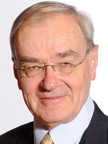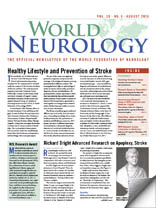
Vladimir Hachinski
When Johan Aarli, my predecessor as president of the World Federation of Neurology (WFN), first mentioned that he was writing a history of the WFN, I realized that this was an important task. However, I did not expect that institutional history would be very exciting.
As Aarli began sharing the chapters that he was writing, I happily realized that I was totally wrong. It is a fascinating book that has gained from the author’s strategy of creating a context by describing what was occurring in the world, then what was happening in the world of the brain sciences and practice and then addressing the specific story of the WFN at different times.
One of his interesting findings is the crucially important role that the National Institute of Health played in the launching of the WFN. The book describes colorful personalities, crises and both generic and specific issues. One could easily conclude at times “same plot, different players.”
The past WFN president gives a lively account of the history of the WFN up to the end of his tenure. I offer a provisional account of the present of the WFN in the accompanying reprinted article that I wrote at the request of the Editor of the Canadian Journal of Neurological Sciences, Bryan Young. The future of the WFN will be determined in Vienna, where a new president, a new vice president, a new secretary-general and one new trustee will be elected. There are multiple candidates for all of the roles, reflecting a healthy interest of individuals in leadership positions for the WFN. Whether the new officers will build on the leadership role that the WFN has achieved with the major world brain organizations during this administration, or revert to a more traditional and limited role will be conditioned by the WFN’s past and present.
In addition to crucial elections, the World Neurology Congress in Vienna promises to be exceptional. The scientific program and teaching courses are of the highest quality, and the congress will be enhanced by the presence of another author: Eric Kandel, the Noble Prize winner, will speak about the highlights of his recent book “The Age of Insight.” Johan Aarli’s book on the history of the WFN, titled “The WFN: The First Half Century” will not yet be available, but can be ordered at the congress.
Vienna has its own attractions beyond that of the congress, and we expect a record number of attendees.
Looking forward to seeing you in Vienna!
See Also
See also Vladimir Hachinski’s article, “World Federation of Neurology: Moving into the Future,” Can J Neurol Sci. 2013; 40: 609-611.
